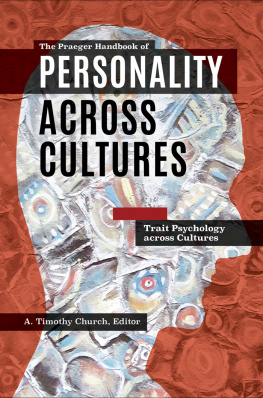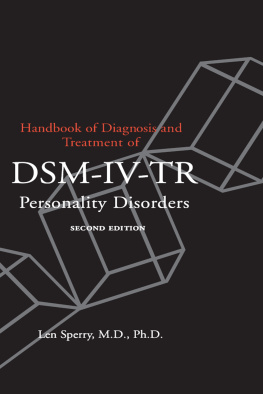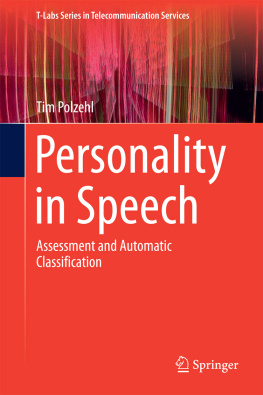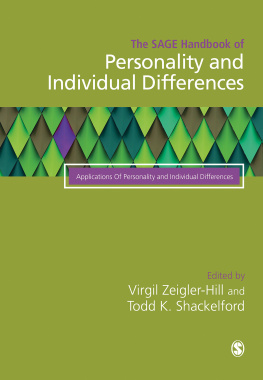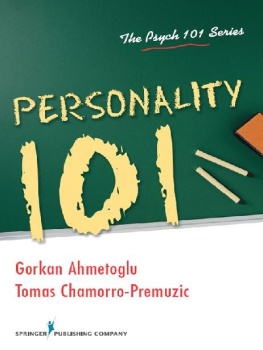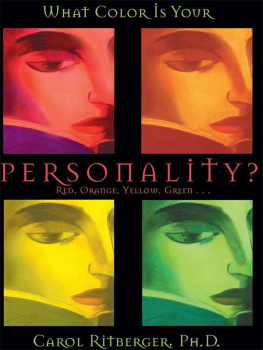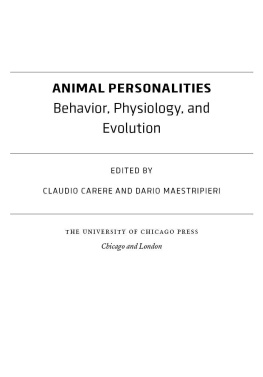The Praeger Handbook
of Personality across
Cultures
VOLUME 1: TRAIT PSYCHOLOGY
ACROSS CULTURES
A. Timothy Church, Editor

Copyright 2017 by ABC-CLIO, LLC
All rights reserved. No part of this publication may be reproduced, stored in a retrieval system, or transmitted, in any form or by any means, electronic, mechanical, photocopying, recording, or otherwise, except for the inclusion of brief quotations in a review, without prior permission in writing from the publisher.
Library of Congress Cataloging-in-Publication Data
Names: Church, A. Timothy, editor.
Title: The Praeger handbook of personality across cultures / A. Timothy Church, editor.
Description: Santa Barbara, California : Praeger, [2017] | Includes bibliographical references and index.
Identifiers: LCCN 2016055017 (print) | LCCN 2017013293 (ebook) | ISBN 9781440841040 (ebook) | ISBN 9781440841033 (hardcopy : alk. paper) | ISBN 9781440849091 (vol. 1) | ISBN 9781440849107 (vol. 2) | ISBN 9781440849114 (vol. 3)
Subjects: LCSH: Personality and culture. | Ethnopsychology.
Classification: LCC GN504 (ebook) | LCC GN504 .P73 2017 (print) | DDC 155.8dc23
LC record available at https://lccn.loc.gov/2016055017
ISBN: 9781440841033 (set)
9781440849091 (vol. 1)
9781440849107 (vol. 2)
9781440849114 (vol. 3)
EISBN: 9781440841040
21 20 19 18 171 2 3 4 5
This book is also available as an eBook.
Praeger
An Imprint of ABC-CLIO, LLC
ABC-CLIO, LLC
130 Cremona Drive, P.O. Box 1911
Santa Barbara, California 93116-1911
www.abc-clio.com
This book is printed on acid-free paper 
Manufactured in the United States of America
To Marcia, Barton, Bradley, and Janet
Contents
CHAPTER 1
Personality across Cultures: Historical Overview and Current Topics
A. Timothy Church
CHAPTER 2
The Five-Factor Model across Cultures
Robert R. McCrae
CHAPTER 3
Personality Structure and Assessment in French-Speaking African Cultures
Jrme Rossier, Abdoulaye Ouedraogo, and Donatien Dahourou
CHAPTER 4
Indigenous Measurement of Personality in Asia
Fanny M. Cheung, Weiqiao Fan, and Shu Fai Cheung
CHAPTER 5
Indigenous Personality Structure and Measurement in South Africa
Velichko H. Fetvadjiev, Deon Meiring, Jan Alewyn Nel, Carin Hill, and Fons J. R. van de Vijver
CHAPTER 6
Psycholexical Studies of Personality Structure across Cultures
Boele De Raad and Boris Mlai
CHAPTER 7
How Valid Are Culture-Level Mean Personality Scores?
Jri Allik and Anu Realo
CHAPTER 8
Regional Differences in Personality: Causes and Consequences
Peter J. Rentfrow and Markus Jokela
CHAPTER 9
Bias and Equivalence in Cross-Cultural Personality Research
Fons J.R. van de Vijver and Jia He
CHAPTER 10
Trait Consistency and Validity across Cultures: Examining Trait and Cultural Psychology Perspectives
A. Timothy Church and Marcia S. Katigbak
CHAPTER 11
Toward a Psychology of Situations across Cultures
Esther Guillaume, Nick Stauner, and David C. Funder
Preface
Personality psychology seeks to understand the nature, determinants, and consequences of individual differences in patterns of thinking, feeling, and behaving. Cross-cultural research on personality is important because individual differences may reflect, in part, the cultural contexts in which personalities develop. Indeed, a more comprehensive understanding of the evolutionary, ecological, and cultural contexts of personality will be achieved when personality dimensions and processes are investigated across a broad range of diverse cultures. In the absence of such studies, we may too easily presumein some cases erroneouslythat knowledge gained in particular cultural contexts will be universally applicable to all people.
Cross-cultural studies enable us to test the generalizability of personality theories, concepts, and measures; the possible need for more culture-specific concepts and methods; and the potential for integrating universal and culture-specific elements. Such studies can benefit both the science and practice of psychology by extending knowledge beyond the Western and educated populations that still dominate much psychological research. With increasing globalization and immigrationand the concomitant need for greater intercultural understandingthese efforts take on even greater significance. As the chapters in Personality across Cultures reveal, many aspects of personality are shared by people in all cultures, perhaps reflecting our shared biological heritage and universal human needs. At the same time, it is clear that many personality processes are conditioned on the natural and cultural environments within which they emerge.
The goal of Personality across Cultures is to provide readers with a fairly thorough picture of the current status of knowledge in the field as well as promising directions for future research. The chapters are organized into three volumes, drawing on the distinctions made by Robert R. McCrae, Paul T. Costa, Jr., Dan P. McAdams, Jennifer L. Pals, and others between dispositional traits, characteristic adaptations, and the biological, ecological, and cultural contexts of personality. Volume 1, titled Trait Psychology across Cultures, focuses on the cross-cultural study of dispositional traits, which refer to broad and relatively stable dimensions of individual differences such as extraversion, agreeableness, and emotional stability. Many psychologists view such traits as biologically based basic tendencies or temperaments. Chapters in Volume 1 address the extent to which trait structure is universal versus unique across cultures; the accuracy or meaningfulness of trait comparisons across cultures; trait consistency and validity; the situations across which traits are manifested; and methodological issues dealing with bias and equivalence in cross-cultural personality research. Volume 2, titled Culture and Characteristic Adaptations, focuses on the relationship between culture and other important aspects of personalityincluding the self, emotions, motives, values, beliefs, and life narratives, which account for additional individual differences and may result from the interaction of basic tendencies and environmental influences, including culture. Other chapters in Volume 2 address the cross-cultural generalizability of personality types (e.g., how traits are configured within individuals) and aspects of personality and adjustment associated with bilingualism/biculturalism and intercultural experiences. Finally, Volume 3, titled Evolutionary, Ecological, and Cultural Contexts of Personality, focuses on evolutionary, genetic, and neuroscience perspectives on personality across cultures and ecological and cultural influences and dimensions.
A book set on personality across cultures should include contributions reflecting a diversity of theoretical perspectives and contributors representing a diversity of cultures. In the field of culture and personality, four theoretical perspectives have typically been delineatedcross-cultural, indigenous, cultural, and evolutionary. However, the boundaries between these perspectives can be fuzzy, some researchers incorporate multiple approaches, and the perspectives are increasingly viewed as complementary rather than incompatible. Research conducted from a cross-cultural perspective typically includes comparisons of multiple (and sometimes many) cultures, with an eye toward cross-cultural universalsfor example, in the structure or organization of personalityor cultural differences amidst these universals. In a typical study, cross-cultural researchers transport existing personality constructs and measures to new cultural contexts to compare their structure, mean levels, and correlatesreflecting an

